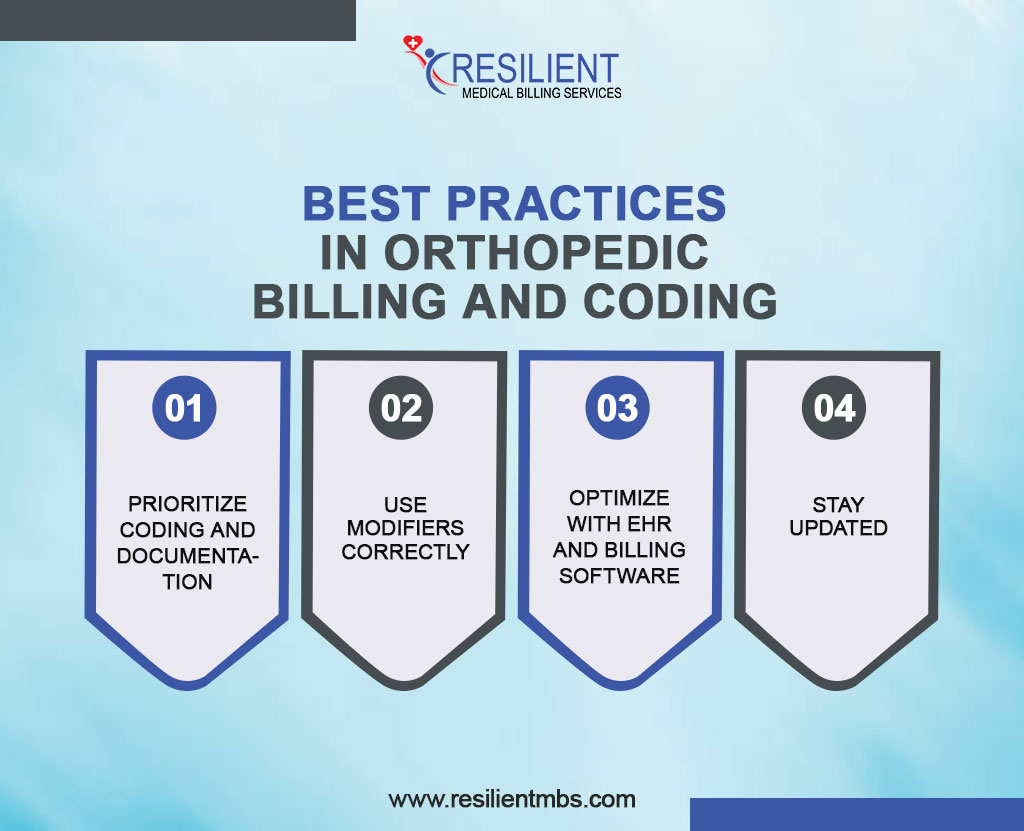Orthopedic surgery billing can feel like a maze one wrong turn, and you’re facing denied claims, delayed payments, and revenue loss. Does this ring a bell?
From joint replacements to spinal procedures, billing for orthopedic care is anything but simple. But with the right strategies, you can turn billing headaches into soaring success.
In this blog, we’ll reveal the latest updates in orthopedic surgery billing and share expert tips to help your practice stay compliant, reduce errors, and get paid faster. If you’re ready to take control of your revenue cycle and avoid costly mistakes, keep reading so you won’t want to miss this.
Understanding Orthopedic Surgery Billing
Orthopedic surgery billing involves coding, submitting, and managing claims for orthopedic procedures, playing a vital role in revenue cycle management. Unlike general medical billing, it requires specialized knowledge of musculoskeletal procedures, surgical modifiers, implant coding, and detailed documentation.
Due to the high cost of orthopedic care, bills must be exact to make sure that payments are made on time and correctly, and to meet the needs of payers.
Best Practices in Orthopedic Billing and Coding

1. Prioritize Coding and Documentation
Precise documentation supports correct CPT, ICD-10, and HCPCS code selection. Coders must interpret provider notes to avoid delays and audits.
2. Use Modifiers Correctly
Modifiers clarify procedures and affect payment. Proper use of modifiers prevents billing errors. Common ones include:
- 22 – Increased services
- 50 – Bilateral procedure
- 59 – Distinct service
- LT/RT – Left/Right side
3. Optimize with EHR and Billing Software
EHRs and billing tools improve accuracy, flag issues, and streamline claims. They also track payer rules and reduce admin burden.
4. Stay Updated
Regular training and staying informed of coding and payer changes are crucial. Join groups like AAPC or AHIMA to stay compliant and current.
Key Updates in Orthopedic Billing
New regulations require stricter documentation, expanded prior authorizations, and bundled billing, while programs like QPP and value-based care tie reimbursements to quality and cost efficiency.
Changes in CPT Codes or Reimbursement Rules
Annual CPT updates and MPFS adjustments affect coding and payment; orthopedic practices must adopt changes quickly to avoid denials and delays.
Impact of Payer-Specific Guidelines (Medicare & Private Insurers)
Payers now require specific coding, documentation, and pre-authorization; staying compliant demands updated reference guides and regular insurer communication.
Common CPT Codes in Orthopedic Billing
Orthopedic billing uses specific Current Procedural Terminology (CPT) codes to document and bill procedures performed by orthopedic surgeons. These codes ensure accurate claims submission, reimbursement, and compliance with payer requirements.
CPT codes are categorized by anatomical location and service type, such as surgical, diagnostic, or therapeutic procedures. Proper CPT usage facilitates smooth billing and ensures appropriate reimbursement.
Common CPT Codes for orthopedic procedures/ BCPD Codes for Orthopedic Surgery include:
27447: Total knee arthroplasty (knee replacement).
27130: Total hip arthroplasty (hip replacement).
25607: Open treatment of distal radial fracture with internal fixation.
26615: Open treatment of metacarpal fracture.
29881: Knee arthroscopy with meniscectomy.
Additionally, BCPT (Bundled CPT) codes may be used in payer-specific billing scenarios for bundled procedures, though they vary by insurer and are not part of the official CPT set. Billing professionals should stay updated on payer policies.
Is Outsourcing Orthopedic Billing Helpful?
Outsourcing orthopedic billing to a specialized orthopedic surgery billing company provides multiple advantages, such as access to professionals who are experts in orthopedic CPT codes and insurance requirements. This ensures more accurate coding and claims submission, reducing the chances of rejections and denials.
It also accelerates reimbursements through smooth workflows and electronic submissions, while helping maintain compliance with evolving regulatory standards. Advanced software and analytics are employed to monitor claims, spot denial trends, and ensure billing accuracy, ultimately improving revenue cycle performance.
Compliance and Claims Management
Compliance is very important in orthopedic medical billing. It makes sure that rules about coding, paperwork, and payers are followed so that there aren’t any audits, fines, or delays in getting paid. Because orthopedic care claims are so valuable, being ready for an audit is even more important.
What Is a DCN Number in Medical Billing?
The Document Control Number (DCN) is key in claims tracking, acting as a unique identifier for claims during the adjudication process and helping manage inquiries, reprocessing, and appeals.
Effective denial management includes:
- Front-end checks for eligibility, authorization, and documentation.
- Real-time claims monitoring to identify denial patterns.
- A dedicated team for follow-up and appeals.
- Ongoing training for coders and staff on updated coding practices.
- Billing software with automation to flag issues before submission.
Concluding Words
Staying informed on orthopedic surgery billing best practices is essential for ensuring efficient revenue cycle management. Accurate documentation, the use of correct CPT codes, and adherence to payer guidelines are key to minimizing claim denials and maximizing reimbursement opportunities.
By partnering with experts in the field, you can simplify your billing processes, reduce costly errors, and ultimately improve your practice’s financial health.
Resilient MBS LLC offers a range of specialized services to optimize your billing operations:
- Comprehensive orthopedic surgery billing and coding
- Accurate CPT code assignment and documentation review
- Payer guideline adherence to minimize claim denials
- Timely submission of claims for faster reimbursements
- Revenue cycle management consulting for enhanced financial performance
- Ongoing audit and compliance checks to ensure accuracy
- Customized solutions tailored to your practice’s needs
Optimize your billing operations with Resilient MBS LLC. Reach out to us today to learn more about how we can help you enhance your practice’s revenue cycle.










